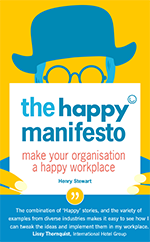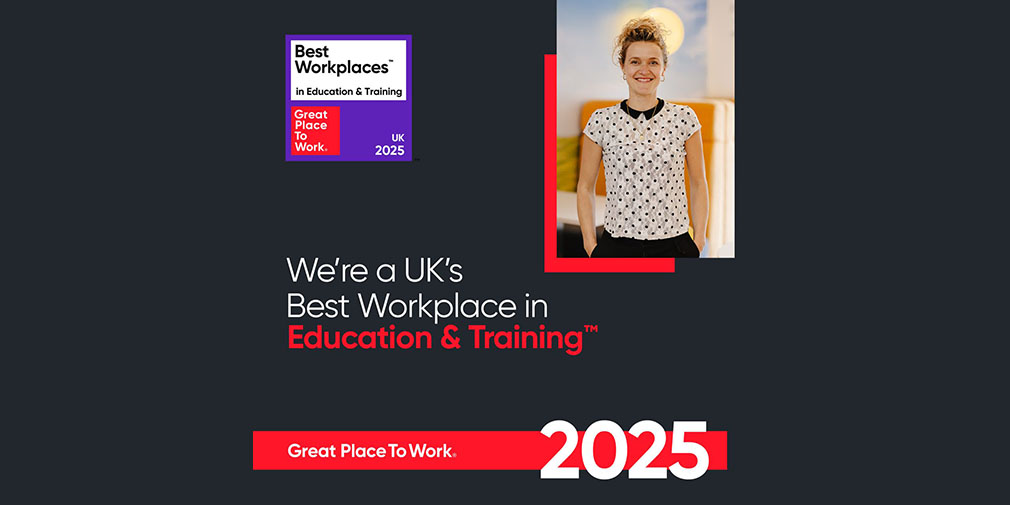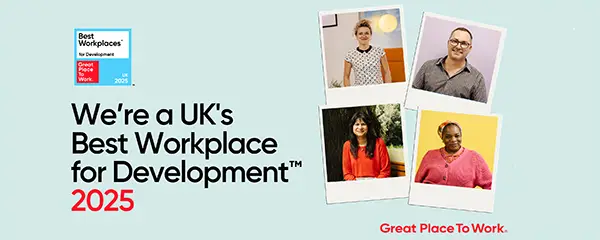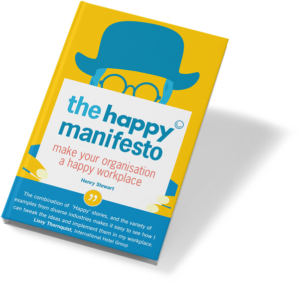My name is Emma Rappaport. I am part of the people development team at Google. Welcome to Start Right, our introductory program for people managers. Now I know many of you have been at Google for years but are now new to management. And the other half of you are new to Google, but perhaps you’ve managed for years.
The reason we invite all of the people managers to Start Right at Google is because it’s our, it’s our course on management philosophy. By management philosophy, I don’t mean that Larry Page came up with a list of ideas that, you know, how we wanted our managers to behave. It wasn’t our HR team. It wasn’t our people deputy.
It was actually Googlers. We did a survey known as the Oxygen Study a number of years ago. And based on the results of that survey, we came up with our management development strategy. And everything that we do to do with management development from training them to evaluating them it’s all based on this study.
Actually, first of all, before I go any further under most of your chairs the ones at the end of the lines anyway, is some post it notes. Can everyone at the end of the lines grab post it notes and just share them amongst your lines so everyone gets one. Okay, so all I want you all to do is just to take your phone and think about the best manager you ever had.
Think back to that manager, no matter how recent or long ago, and write down one or two words to describe them. Just one or two words that come to mind when you think of that manager. Okay, now turn your piece of paper over, and this time think about your worst manager. The worst manager you ever had. One or two words or a phrase that describes them.
This part always, always produces the most laughs. Okay, is anyone willing to share one or two things about their best manager? And then I promise it becomes the worst. My head was open. Open? I think he always said he’d have the document rewritten for me. That’s very talented. Okay. Fantastic. Thank you very much.
Let me get on with it. Let you get on with it. Okay. Really interesting. Both points that we’re going to touch on in a little bit more detail shortly. I’m going to move on to the worst manager. Anyone willing to share a few things from today? Yes. There’s like a heart on her sleeve, so sometimes if you do something wrong and they were angry, you could tear.
Okay. It didn’t help get anyway. Okay. There’s no moderating of behavior, it’s just all kind of out there. Okay. Anyone else? Absent. Absent? Okay, and the final one. Stole successes. Stole successes. Very interesting. I’ve had one of them. Um, and we’ll get to this in a moment. Essentially, I just wanted to show manager behaviors do matter.
We all remember them, and the thing is, we tend to remember the worst ones more than anything. And you started hearing the sort of chuckles around the room. It really does have an impact. I don’t want to get the name wrong. Action for Happiness. The, the presentation we saw just before lunch. They said, you know, the thing that affected your mood, your happiness more than anything was your boss.
Well, it affected it in a negative way. Which was Okay, so what I want to cover now, then, in this 35 minutes that we have is on the right hand side. I wanted to show you, if you were new managers at our Start Right training, what you’d cover on the left hand side. So in the actual Start Right training, we go into a lot of detail about the attribute views that the oxygen study gave us what they looked like, what the behaviors looked like.
For now, though, I just, I thought it would probably be more useful for all of you if we talked about how and why we did the study and what it actually showed. But then, more importantly, how are we using it? How we’re still using it today? And then I’ll obviously leave time for questions at the end. Is that okay?
Great. Okay, so first of all, the people that did this study in this research, known as our People and Information Lab or our Pi Lab, they’re kind of like a department. So they run a number of experiments and do a lot of research. The reason they looked at managers was that in 2009 we looked at the exit interviews and one in nine Googlers said that stated their manager is a reason for leaving.
And of those, 43 percent of them said that we could have done something differently to keep them. So we kind of thought we knew what made a good manager. You know, you, you, you think you have an understanding and we certainly did, but decided actually let’s, let’s do some proper research and, and get some data to back this up.
So the PyLab went ahead and did this back in 2009, and it came out with three main results. The first one was that there are eight common behaviors that great managers use, or seem to be doing. There’s also five common pitfalls that not so good managers can fall into, but more importantly, and we’ve actually continued this research, is that having good managers really does pay off.
And Probably the middle one, happier Googlers, is the most relevant for us to do here today. So, so having these great managers, it is worth it, it is worth the investment. We’ve also found here that when we do focus on an area of development as a company, as an organization, we can move the needle.
And so a lot of resource and a lot of time went into this, but we continue to, to use it going forward. So the methodology that we used was essentially we took all of our managers, 100 percent of our managers, and we used two two data points, I guess, to decide on the top, the highest performing, so your top 25%, and your lowest performing.
We used two things which we have internally. One is Perth, which is our performance management system and the other one is Google Guys, which is our internal survey that we do annually across the organization. Kind of like this. So those two things provided our top sort of, quartile of, of group managers, and then the bottom quartile.
And with the top, we then used a number of different data points to understand what are, what is this actually, what are they looking like, what are they doing, how are they behaving. And we used a number of different things there as well. These are all internal sort of data points. data points, I guess, that we use, but things like interviews, we did double blind interviews, both of their teams themselves, their performance reviews, the survey that I talked about, and then nominations for great managers.
We used that data as well and pulled all the information together and organized it into themes. So what did it show? I’ll give you a moment to read this. These are the eight attributes, the eight good manager attributes that we came up with.
So the story goes that when these eight attributes were shown to our director of HR, our director of people ops, he looked at them and said, that it, none of this is rocket science. It’s not probably none of it kind of makes you go, well, but the interesting point is actually the order by which they’re listed and the orders relevant because the higher up on the list, they appear.
The more frequently these statements appeared in these interviews in these references in these great manager award nominations. So is a good coach was the highest, had the most frequent number of instances of someone referring to that as a positive behavior. It’s interesting for us, especially as an engineering organization, with half of the organization being engineers, what we had believed previously was that we needed brilliant experts, you know, technical experts.
to lead our technical teams. And while absolutely this study shows that it is, it is important, it’s actually lower down the list than a number of other perhaps softer skills.
So what we do now in a normal Start Right course is that we would look at each of these behaviours in a lot of detail. We’d get into, into groups and go through each one and try and kind of pull out what does it actually look like when you’re being a good coach or when you’re being a good communicator.
You know, what does it look like in the real world? We then have people try and figure out, and I’m going to give you a document to help you do this later on, where am I lacking? So which of these eight am I perhaps not as good at? It just means that then by the time they leave and start the right course, every new manager has one area to work on, or one area if it’s done, that they can actually move forward with afterwards.
For now though, I’m just Sudeer to bring the hand out to the right. Probably just give it to the end of each line. So sorry if anyone is writing down these eight, you’re going to get a handout now, I probably should have done that. It’s nice to have it again. So the list that you’re seeing now is a list of the eight good manager behaviours.
What I wanted to do was just split the room into four. This could get a bit complicated, bear with me. So I’m going to do it from your angle. So front left of the room, so front of two rows. And front right of the room would be front of two rows. Okay. And then you’ve got bottom right of the room from your angle and bottom left.
So if I could just have everyone sort of turn to the people next to you. If you’re in the front left of the room, focus on the top two behaviours. So, coaching and empowering the team. Front right, the next two, so three and four. Back left, five and six. And back right, seven and eight. But if you missed that, just choose two of the behaviours to discuss in a pair or three.
Okay, I’ll ping it in about three minutes. What do these behaviors actually look like back at the workplace? Excellent. Okay, I’ve got a mic on now, so sorry if the, apparently the camera man can’t hear me. Okay, so I want to go through this list of eight and just drop in a few specific Google examples as well.
But I’d love to hear what you all came up with. So who was doing coach? Anyone come up with a nice example of what do you think that behavior looks like? He’s a good coach. Yeah. Yeah. Yeah, absolutely. I think that’s your behavior is so important. We have here a lot of we have formal ways of giving developmental feedback, but also we really encourage managers to do it in an informal way as well.
So that’s really timely. The sort of mechanisms that we use for For these, I guess, coaching scenarios, is that we expect every manager to have one to ones with their directs, no matter how large their team. Sometimes it may be weekly, if you’ve got a smaller team, sometimes more less frequently.
And this is even if you’re, you know, thousands of miles away. My manager and I have one slot during a week that we can meet because she’s based in California. It has to drop the children off at school first. So we, you know, we meet one time every single week. But it is an expectation. The one to ones are absolutely run by the person the report rather than the manager.
So I will decide what we’re talking about. I’ll take responsibility for, for thinking through the structure of it. Things like that. Okay, empowers the team and doesn’t micromanage. Quite straightforward, but who had a few, like, examples? It was this part of the room as well. Anyone? Didn’t get to that one.
Too much coaching. Anyone get to this one?
Yeah, that’s really nice. We use that rather than focusing on the what, the what is important, but the how is almost even, like, almost more important. An example here that came up a number of times in the survey was that people said my manager gives me really big stretch goals. You know, they give me huge challenges and while they might have the answer or might have done it before, they let me figure it out.
It’s that thing we were talking about earlier about trust and accepting failure and actually supporting failure is really important. Okay let’s skip to Productive and results oriented. Who did that one?
Didn’t get to that one? Three? Okay., so these are all sort of obviously important. I just wanted to give you an example. The productive and results oriented. At Google we have something called OKRs, which are just quarterly objectives that we set., and they’re meant to come from, it’s meant to be a kind of waterfall effect.
So they start with Larry Page and they go all the way down. So you wait until your department has come up with their departmental OKRs at the beginning of the quarter, then the next line, then the next line. And so you can see how your, even if it’s a tiny, tiny objective or project, is linked back to the, the end goal, that you can see how you’re adding value.
I think we all know how, how important that is for, for happiness and just overall motivation. So your OKR is what your manager and you care about, and you talk about your OKRs. You set them at the beginning of the quarter, and then you review them at the end. So it’s not really about, and I guess this goes to number three, it’s not about what time you come in in the morning, or what time you finish work, or where you’re working.
It’s about how, and, like, what you’re meeting, and then how you’re meeting those OKRs. It’s really important. Oh, sorry, probably a bad example. I was saying it’s not important about hours. Hours aren’t important. What’s important is your OKR. So meeting your objective, OKRs are Objectives and Key Results.
What does OKR stand for? Objectives and Key Results. That’s absolutely right. So I think something about empowers, is about, you should have stretch OKRs. If you meet all your OKRs perfectly, at the end of each quarter, you probably haven’t had challenging enough OKRs.
The idea is just keeping motivated and keeping stretched. Okay. Yeah. Yeah, 70 percent is a Yeah, a really, really high achievement. Why is the how important? It’s a good question. The how is I can’t get this to stay up. Sorry. I think it’s like our security switches off our computers or something.
One moment, let me do that. the how is important, because the way that you, what you achieve in a project, like you might have to run over 20 people on the way to achieve that goal. what’s really important, and someone actually mentioned it as well in a slightly different guise, but the journey of getting to the end point is just as important.
So, how many relationships are you building? Are you bringing in the right people? Are you making sure you’re not duplicating efforts? You know, you might achieve something and make, ah, it’s like a huge wow, but have you up, you know, have you upset 10 other people? people on the way or have you actually done something at the same, you know, same time as someone else.
That’s not a very efficient use of time. So the how is sort of how you reach that goal. The kind of journey along the way.
And yeah, do you have a question?
Audience Member 1: [unintelligible question]
And that’s absolutely, I, the how isn’t isn’t looked at in a huge amount of detail. Like it’s not that the manager doesn’t sort of follow you along, I guess that journey and see how you’re going about it. But you know, from interacting with other managers, interacting with other groups you get feedback.
We do 360 degree feedback for example, so that you know sort of how someone’s perceived or what they’re, how they’re working. That makes sense.
it’s changing at the moment. It used to be annual, I think we’re going to Perth. It’s kind of going to twice a year. So four times a year we did performance management and that’s with your manager. We do the manager. It is their responsibility though to check in with other people that you’ve been working with.
Because as I said, my managers in California, I work with Sudhir every single day. So at, you know, he’s going to probably have a lot better visibility into my work than my manager might do. But that the, the three of us need to make sure that communication sort of line is open.
Audience Member 2: Do you publicize 365?
Emma: Do we publicize the 360 feedback to the team or not to individuals, to manager for manager feedback? Yes. It’s public to the team. For individual three sixties, no. And we call it annual perf. And you get it. You get all the, all the feedback and you sit with your manager. You’re encouraged also to talk to the people who gave you that feedback.
You know, to thank them for it and to ask any questions if you need to.
Audience Member 2: So the manager’s feedback is meant by the It goes down.
Emma: Yeah, it goes to the person, yeah.
Audience Member 2: … Especially if it’s not so positive.
Emma: Yeah. Yeah, it’s an interesting point and we are actually revising our perf system at the moment for, for kind of that reason to try and encourage more regular feedback sort of face to face. We do try and create a culture of feedback to giving one another feedback at the, at the, at the time. We have this formal system for kind of a formal, you know, performance management just to record it.
Audience Member 2: ….
It’s hard to encourage people to be negative to be constructive or developmental, but it is strongly encouraged. My manager, for example My previous manager, she had a large organisation, there were about 60 of us. And before we all wrote Perth last year, she sent an email saying please, please try to make at least 50 percent of it developmental.
So, she kind of tried to set the standard and say, you know, I really, let’s all encourage each other to do this, because it’s the most useful. And actually people here really crave that feedback. I’m gonna move on from this, but are there any of these eight that sort of stand out that you would like an example or a little bit more detail?
Audience Member 1: [unintelligible question]
How laid back?
Emma: Well we have a phrase here, a quote which says ask for forgiveness later. Don’t ask for permission, ask for forgiveness, is the, is the quote. It’s hard to say what, how, like, where on that spectrum we are, because I think it does depend from manager to manager, team to sort of what perhaps level the person is.
If they’re new, you know, if they’re a recent graduate, for example, they’re going to need more hand holding than anyone else. We try and encourage people to think about people rather than as a sort of full person, think about them in their tasks, you know, as a manager. There might be a task that actually I can do easily standing on my head.
My manager probably shouldn’t check in with me about that. But something else that maybe I’m new to maybe it’s a new skill that I’m developing, I’d need more hand holding from my manager, or, or just support from my manager.
Audience Member 3: Can I ask about career development? What, what does that involve? Does it include encouraging someone to look for their career outside Google? Not as a negative thing, but as a positive thing. Does it, does it look, is it all about jobs, or is it just about the task?
Emma: Really good question. Of those eight in all honesty, career development is the one that we are trying to work on the most and to really understand what does it mean here, what we’re trying to do, and I think we have managed to do quite successfully in the last few years is to move people away from thinking career development is just about promotion.
It’s still career development still doesn’t score as highly in some of some of our other areas here. So, yeah, we have. We were known. I think our director did say, you know, it’s it’s up to the individual. If they need to leave to develop their careers and to feel that they’re getting the right challenge, then that’s the right decision for them.
Up to you and the manager, but it’s kind of it should be. It should be everything. It should be encompassing everything. It’s not just promotion or level. It’s new skills. It’s new challenges. It’s, you know, new amounts of responsibility. I mean, basically, I mean, It is something that we’re currently really focused on.
Yeah. It’s more about creating more opportunity. Yeah. We say opportunities like that. Yeah. That we have in, in this company. Yeah. So, it’s just a matter of Opportunities. And you’ll achieve that.
To give a, like a practical example of those opportunities, we have rotation programs. So you can do, go and do something called a bungee roll, which is where you literally bungee out of your team. And you’re going to spend three months trying to solve a problem or work on a project in a totally different area of the company that maybe they’re struggling to, to solve or, or work on.
And then the idea is that you can bungee straight back into your old role. I’ve been here six years and I’ve had four different jobs now at Google. And they’ve all been in the training team, but they’ve been quite significantly different.
Audience Member 4: 20 percent time. Is it a myth?
Emma: So the 20 percent time was very much for engineers in the early days.
It was just to encourage them to spend some of their time being innovative and creative and doing something they really cared about. It’s not formally in the rest of the company, but I have never in my time at Google spent 100 percent of my time working on my direct managers remit ever, even for a quarter.
You are absolutely encouraged to support other teams, to work with other teams, to find projects that really interest you. And I think that’s almost certainly the case for everyone in my, in our group. If you’re truly passionate about something and you feel like you can demonstrate something, you can put a proposal together and actually just do it.
But you don’t take every Friday off. Oh, no. You’d have to actually do something that shows value to the community. Yeah. It’s showing value to the company. It’s at the 20 percent time is absolutely not just like wander around. It’s, it’s, you know, you, we understand that there’s some basic things here that have to get done every day.
The recruiters here, they spend a lot of their time booking interviews. You know, and that probably for some of them can get quite tiring. So actually spending 20 percent of their time doing something completely different, it’s going to keep them happier and challenged and more developed as a result.
And it also means that we’ve got more movement within the organization. Because you begin to know other departments and build relationships in your network.
Audience Member 5: How do you balance how do you balance the productivity of a manager, assume that they need to have other stuff to do, except managing his team?
Emma: How do you manage people managing? The eternal struggle. It’s hard. You, being a people manager here is not an easy job at all, because you do, you spend a huge amount of your time managing people. And then you also want to be delivering stuff. It depends from manager to manager, it really does. We are evaluated, and I’ll get to that in a moment.
People managers are evaluated on their, how they are as a manager. So it is a really important part of their day to day work. And it’s really highly valued, as hopefully this study does show. They have to figure out that balance though.
Final question, then I’ll move on.
Audience Member 6: That’s a bit anal, but we do have a cautious system the same as you.
Emma: It’s Not the perfect waterfall. It might go. Yeah, it might jump up. And then Larry’s goals are announced at the beginning of the quarter in all hands, and we’re all expected or encouraged to attend. And it’s recorded for those of us who it might be the middle of the night. So we’ll we see those at the beginning of the quarter.
Different departments work in slightly different ways. We try and get our, each individual’s goals out within, I think, the first four weeks of the quarter, which is still a third into the quarter. But it’s not like, you know, one quarter ends and you stop working and then the next quarter starts and you start something new.
There’s some that are ongoing. So they tend not to change dramatically from one quarter to the next. Although, you know, beginning of the year or maybe every other quarter they would do. So, I’d say, I think about three weeks is probably the, the average. We’re changing to a half year at that time.
It’s going to be six months left. Yeah, because it’s taking a long time. And we’ve learned from that, yeah. And so one thing is, is moving to six months.
What Project Oxygen also showed then was the challenging areas. There’s five areas that Google managers struggle and again, I don’t think you’ll read any of these and think, Oh, I knew, but again, it’s it’s ordered in terms of how frequently these things came up.
Audience Member 6: You don’t have it to hand, I suppose?
Emma: I do not, you have to write this one, sorry.
Luckily there aren’t as many, I think speaking to points two and three and the lack of consistency and performance management. It doesn’t. The thing that came up a lot in these interviews was some people feeling that only the top, the high performers or the low performers were getting the time with the managers, the one to one rather than the people in the middle.
And then again, the lack of consistent approach with career development was managers who would say, you absolutely have to write a personal development plan and then not follow up that on it. So it’s just having the consistency, from beginning to end with all your team and all the behaviors.
The fairly strict sort of, I think quite clear, but does anyone have any questions about?
Audience Member 7: [Unintelligible Question]
Emma: There is no strict like limit that I’ve ever heard of. It’s a very, very individual approach. But for someone who’s underperforming for a long period of time and you’ve tried, you put together a plan for them. Which person in HR, your manager, and you as the underperformer would sit down and agree to it.
So it’s kind of a contract. These are the things that we’re all going to do to try and improve your performance. That’s the main thing that’s coming up with this, this plan. And it could be actually moving departments. It could be changing roles. It could be moving teams.
Audience Member 7: Yeah, I was about to say, I mean, we’ve found a lot in a lot of cases, people are just in the wrong role. Once we put them in a new role, that goes up.
Emma: We had to do quite a bit of coaching on managers on this, who weren’t that, you know, maybe they had a vacancy in their team, and they saw someone coming in and they’re looking at scores, and they’re saying, no, but they’re underperforming. So we did do a study to show that when people move roles, their performance generally goes up.
And so now it’s, a way that we deal with that.
Audience Member 8: [unintelligible Question]
Emma: We’ve got a, an internal kind of tool which is called compass and it has all our not compass, it’s called magnet. It has all our internal jobs on it. And so there’s a way that you can search by skills by department, by career ladders, things like that. I think if we didn’t have that, it would probably be a conversation with the person going back to, you know, what skills, what are they enjoying doing?
What are they not enjoying doing? And then. Trying to fit, maybe meet other managers and see how you can fix it.
Audience Member 8: [Unintelligible question]
Emma: It’s not normally new people actually. It’s people that have been here for maybe five years. Because people spend quite a lot of time, general sort of tenure is, is very, very long here. And you know what it’s like in your sort of early twenties, late twenties, your career aspirations changed, your personal life changes, which might have an impact on your career choices.
So it’s more people who’ve been here for a while. I’m sure there are instances where someone’s been put in the wrong role, but hopefully our hiring the methods that we use in hiring, try and get someone. So at that time, they’re really well suited to the role. Each of the roles that I’ve been in, for example, I’ve been in for two years and I’ve loved them.
And it’s only been in the last few months that I’ve thought, I’m loving this, I’m really enjoying it, but I, I want to make a big change. And mine has always been quite, like, I think quite sensible changes, like for, if you look at the career ladder. But don’t you think that that’s not that you’re in the wrong role, that that’s actually…
I think the new challenge for me came as a new role, because we still needed someone fulfilling the role that I was doing previously. Okay. So, what next? And why, what do we do now at Google to continue to sort of use this, this knowledge, I guess, that we we got? The first thing is that oxygen and those sort of eight attributes they’ve really helped to shape our career manager development strategy.
And we realized that in the first six months, it’s incredibly important to, to sort of reach, touch managers then, to get, you know, reach them then. This course for example, Oxygen, is the kind of philosophy course, so talking about the eight behaviours, and normally we’d go into a lot more detail about what those behaviours look like.
The other thing is that we have something called a manager essentials class which is more the tactical side. Ongoing then with manager development, what we’ve actually done, it’s probably quite small, is try to map our classes that we have on offer to the actual oxygen attributes. So I’ve just put an example here, if someone is micromanaging or feels they might be micromanaging, or perhaps feedback shows that they’re inclined to micromanage we can suggest a course for them to go on.
This one is situational leadership, which I’m sure many of you have heard of. We’ve got those mapped against it. The way the way that they kind of can be directed towards some of those res that those resources is through our evaluations. Our manager evaluation is in a number of ways, but the main one is something called an upward feedback survey.
It’s happens twice a year and everyone at Google has sent this and all really, really encouraged to fill it in. The upward feedback survey asked questions around those eight attributes that we’ve already gone over so that then at the end, every manager gets a report. It’s aggregated data, so there’s nothing, there’s no individual.
You don’t know who on your team has given you certain scores, but you can see as a result, you know, you can get feedback from your team and because it’s mapped to the eight attributes, you can then sit down and say, okay, this one I’m really strong at. Maybe I can help coach my peers or support my peers who aren’t so strong in that area.
And maybe there’s an area that I’m struggling with a little bit. I can go and look at, see what courses are available. We also do a great manager award, which is to recognize the great managers. And again, we use these eight attributes and ask for examples in those. And then the other thing that we found is really useful is the community building with managers.
And so really try and encourage managers to be sharing their experiences and their challenges. Because I think that’s probably when the most, you know, useful kind of use cases come out. We have things like local office groups. We have email aliases. Normally in the start right training, we’d have one person from the training team and one manager who has been nominated for a great manager award so that you can, you can meet a great manager to begin with these courses as well.
Part of the aim of them is to really start building that community and we encourage them to create a kind of group, create an alias, create a group on Google plus and meet regularly, share your challenges or your good wins.
An email is like an email group. So, a group of people who all share one you’ve seen like, how do I explain that, an email group. You’re all maybe it’s called Managers in London. And I, I like, sign up to that group and so then I can receive all emails to Managers in London. We’ve got like Women in London group, we’ve got New Mother group, we’ve got lots of different groups that everyone can kind of contact.
Audience Member 7: Are they anonymous or not? Because it only suggests they’re anonymous.
Emma: No, they’re not anonymous. That the majority of them are internally run and we try and use good managers like managers who’ve been nominated for the good manager award to run them or co run them. If it’s something like situational leadership where you need an accreditation we’ll have people within the training team or wider sort of HR team go through that.
Then we try and pair them up with a good manager, even if they can just come in for a Q and A bit at the end of each day. Yeah, they’re all run internally.
You have a question?
Audience Member 8: [Unintelligible Question]
Emma: it’s one of our courses and I wouldn’t say it’s totally like, obviously sort of related because it’s more part of our well being program. But as you saw, one of the top eight attributes is caring about your your team and their well being. So search inside yourself. It’s part of a group of courses or sort of things that we run for to encourage well being.
And so perhaps if you’re concerned about one of your team members well being, maybe you offer you suggest such inside yourself as a as a course to attend. Does that answer it?
Audience Member 8: It does.
That’s a good question. So one of the has anyone heard of managing your energy? We offer a course called managing energy, which is about your energy and how to manage it. Sort of emotional energy, physical energy, overall happiness. I guess it’s sort of what we’re talking about today and we encourage all managers to go through a managing.
Um, and managing your energy for managers course to try and show them how performance could be, um, impacted so much by sort of unhappy or, um, people who well being isn’t a priority. So well being is a massive priority here. Um, one of our, um, big parts of our Google guy survey, the annual survey I was talking about earlier is about people and their well being and how they’re doing work life balance.
We haven’t Got it completely right yet, but we’re continuing to work on it. Yeah, but you’ll hear from a bond later, which you’ll be talking about. There she is. Okay, you’ll be hearing from exactly what you’re talking about. Creating just end then, because I’m conscious of time. I think we’re Yeah, right. The end.
Audience Member 8: it’s just that we in this course, we try and encourage managers to think of themselves as the custodians of
Emma: Google culture. So we asked people to throw across, you know, words that mean culture to them at Google. And it’s normally things like openness, trust or date, you know, setting audacious goals, being brave, being supportive. And we say, yeah, all these, all these words are, you know, what Google culture means to us.
And it’s up to you as the managers to live those and to be the custodians and guide your teams through those through that culture. Okay. We’ve got another question. I think it has to be the final question. That’s my final side.
Audience Member 9: What tracks sucess? Great marks or…?
Emma: I think success and proving, proving proven track record is absolutely one thing that we look for. But kind of Googliness, which are these qualities sort of embodied by our culture is, is as important. And we interview for those qualities as well.
Audience Member 10: How long is your interview process?
Emma: I can’t tell you exactly because I’m not a recruiter, but I know it’s come down recently to it’s it’s between kind of three to five interviews, I think. And it could take some, some roles that they fill on the, on the day they go to campuses and recruit on the day. And then there’s some roles that take a lot longer on the conversation by do you mean interview?
Audience Member 10: Yes.
Yes. I think it’s that and it’s also academic records.
I hope that was helpful. Um, thank you very much.



















